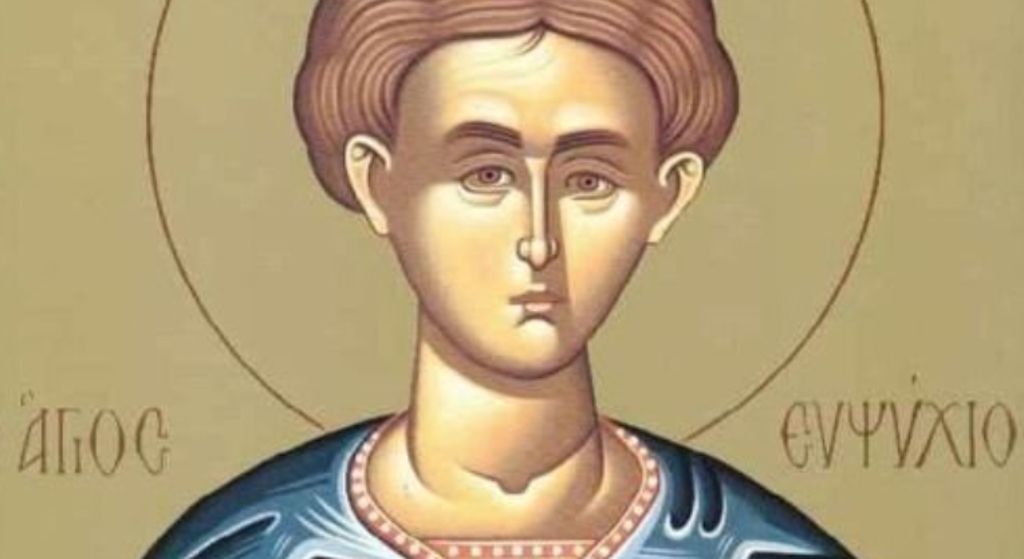Martyr Eupsychius of Caesarea, in Cappadocia (9 April)


The Holy Martyr Eupsychius was born in the city of Caesarea in Cappadocia and received a Christian upbringing by his illustrious parents.
During the reign of Julian the Apostate (361-363), Saint Eupsychius entered into a Christian marriage.
At Caesarea there was a pagan temple to the goddess Fortuna, whom Julian the Apostate revered. As Eupsychius was going to his wedding, the pagans were offering sacrifice to the goddess Fortuna.
Saint Eupsychius was filled with zeal for the Lord, and he destroyed the temple. He knew that this would inevitably result in his punishment. Saint Eupsychius distributed all his possessions to the poor and prepared himself for martyrdom.
The enraged emperor Julian loosed his wrath not only upon Saint Eupsychius, but against all the inhabitants of this city. Some of the citizens were executed, while the more respectable were sent into exile. Christian clergy were drafted into military service, and he looted the churches of anything valuable. The city was deprived of its title Caesarea [i.e. “Imperial”] and resumed its original name of Maza. He also imposed a severe tax on the inhabitants. The emperor threatened to annihilate the city altogether, if the people did not build a new pagan temple in place of the one destroyed.
Julian tried to compel Saint Eupsychius to offer sacrifice to idols. For many days they tormented the saint on a rack, and also with iron claws. But his faith was firm, and the judge sentenced the martyr to be beheaded with a sword.
Then Julian embarked on a campaign against the Persians, marching through Cappadocia and approaching Caesarea. Danger threatened the city, since the emperor intended to raze it to its foundations. But then Saint Basil the Great (January 1), showing Julian the proper respect as sovereign authority, came out to meet him carrying with him three loaves of barley bread, which he ate. The emperor ordered his retainers to take the loaves, and to give Saint Basil a pinch of hay saying, “You have given us barley, cattle fodder. Now receive hay from us in return.”


The saint answered, “O Emperor, we bring you that which we ourselves eat, and you give us cattle feed. You mock us, since you, by your might, are not able to transform hay into bread, the essential food of mankind.”
Julian angrily retorted, “I’ll shove this hay down your throat when I return here from Persia. I shall raze this city to its very foundations, and plow over this ground and turn it into a field. I know that it was on your advice that the people dared to destroy the statues and temple of Fortuna.”
After this the emperor continued on his way, but soon perished in his campaign against the Persians. He was struck down in the year 363 by the holy Great Martyr Mercurius (November 24).
After the emperor’s demise, the Christians of the city of Caesarea built a splendid church over the grave of Saint Eupsychius, and from his holy relics they received help and healing.
This holy Martyr was from the parts of Cappadocia, and lived a blameless life with his wife. During the reign of Julian the Apostate, this blessed one was filled with divine zeal and, with other Christians, destroyed the pagan temple dedicated to Fortune. Because of this he received the crown of martyrdom by beheading in the year 362.
Eupsychius was of noble birth and was well instructed in pious beliefs. During the reign of Julian the Apostate, and when St. Basil the Great governed the Church of God in Caesarea, Eupsychius entered into marriage with a prominent maiden. However, it was not given to him to live even one day in marriage. At the time of his wedding, it so happened that there was a pagan feast with sacrificial offerings to the idol Fortune. Eupsychius, with his companions, entered the temple, smashed all the idols and even demolished the temple itself. Hearing of this, Julian became greatly enraged and ordered that the culprits be beheaded, that many Christians be inducted into the army, that an enormous tribute be imposed upon all Christians, that the temple of Fortune be rebuilt at the expense of the Christians, and that the city be deprived of its honorary name “Caesarea,” given it by Caesar Claudius, and be called by its former name, Maza.
Eupsychius was first tied to a tree and brutally tortured, and was later beheaded, in the year 362 A.D. Shortly after this, the wicked Emperor Julian visited this city on his way to Persia, against which he was waging war. St. Basil the Great went out to meet him, carrying three loaves of barley bread as a sign of respect and hospitality. The emperor ordered that a handful of hay be given to the saint as a reciprocal gift. St. Basil said to the emperor: “You make jest of us, O Emperor. We offer you bread by which we feed ourselves, and you, in turn, give us food for livestock, which you, by your authority, cannot change into food for men.” To this the emperor replied: “Know that I will feed you this hay when I return from Persia.” However, the wicked apostate did not return from Persia, for he died a deserved and unnatural death.
Apolytikion of Martyr Eupsychius
Fourth Tone
Thy Martyr, O Lord, in his courageous contest for Thee received as the prize the crowns of incorruption and life from Thee, our immortal God. For since he possessed Thy strength, he cast down the tyrants and wholly destroyed the demons’ strengthless presumption. O Christ God, by his prayers, save our souls, since Thou art merciful.
Source: oca.org / goarch.org / westserbdio.org




